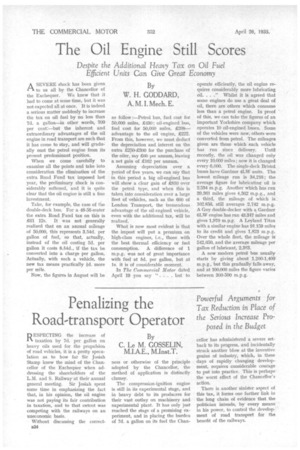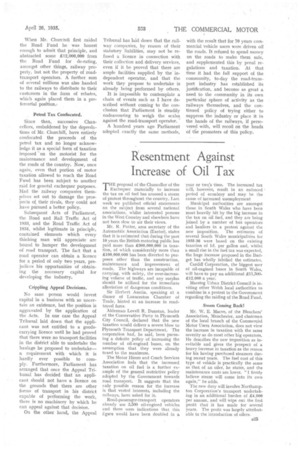Penalizing the Road-transport Operator
Page 42

Page 43

If you've noticed an error in this article please click here to report it so we can fix it.
Powerful Arguments for Tax Reduction in Place of the Serious Increase Proposed in the Budget By C. Le M. COSSELIN, M.I.A.E., M.Inst.T.
ESPECTING the increase of taxation by 7d. per gallon on heavy oils used for the propulsion of road vehicles, it is a pretty speculation as to how far Sir Josiah Stamp knew the mind of the Chancellor of the Exchequer when addressing the shareholders of the L.M. and S. Railway at their annual general meeting. Sir Josiah spent some time in emphasizing the fact that, in his opinion, the oil engine was not paying its fair contribution in taxation, and to that extent was competing with the railways on an uneconomic basis.
Without discussing the correctn24 ness or otherwise of the principle adopted by the Chancellor, the method of application is distinctly clumsy.
The compression-ignition engine is still in its experimental stage, and in heavy debt to its producers for their vast outlay on machinery and experimental plant. It has only just reached the stage of a promising experiment, and in placing the burden of 7d. a gallon on its fuel the Chan cellor has administered a severe setback to its progress, and incidentally struck another blow at the inventive genius of industry, which, in these days of rapidly changing development, requires considerable courage to put into practice. This is perhaps the worst effect of the Chancellor's action.
There is another sinister aspect of this 'LAX, it forms one further link in the long chain of evidence that thepolitician intends, by every means in his power, to control the development of road transport for the benefit of the railways. When Mr. Churchill first raided the Road Fund he was honest enough to admit that principle, and abstracted some £12,000,000 from the Road Fund for de-rating, amongst other things, railway property, but not the property of roadtransport operators. A further sum of several millions was also handed to the railways to distribute to their customers in the form of rebates, which again placed them in a preferential position., Petrol Tax Confiscated.
Since then, successive Chancellors, emboldened by the depredations of Mr. Churchill, have entirely confiscated the proceeds of the petrol tax and no longer acknowledge it as a special form of taxation imposed on the motorist for the maintenance and development of the roads of the country. Now, once again, even that portion of motor taxation allowed to reach the Road Fund has been subject to another raid for general exchequer purposes. Had the railway companies themselves set out to damage the prospects of their rivals, they could not have pursued a better policy.
Subsequent Acts of Parliament, the Road and Rail Traffic Act of 3933, and the Road Traffic Act of 1934, whilst legitimate in principle, contained elements which every thinking man will appreciate are bound to hamper the development of road transport. The fact that a road operator can obtain a licence for a period of only two years, prejudices his opportunities of obtaining the necessary capital for developing the industry.
Crippling Appeal Decisions.
No sane person would invest capital in a business with so uncertain an existence, but the position is aggravated by the application of the Acts. In one case the Appeal Tribunal laid down that the applicant was not entitled to a goodscarrying licence until he had proved that there were no transport facilities in the district 'able to undertake the haulage he proposed to undertake— a requirement with which it is hardly ever possible to comply. Furthermore. Parliament has arranged that once the Appeal Tribunal has decided that an applicant should not have a licence on the grounds that there are other forms of transport in his district capable of performing the work, there is no machinery by which he can appeal against that decision.
On the other hand, the Appeal Tribunal has laid down that the railway companies, by reason of their statutory liabilities, may not be refused a licence in connection with their collection and delivery services, even if it be proved that there are ample facilities supplied by the independent operator, and that the work they propose to undertake is already being performed by others.
It is impossible to contemplate a chain of events such as I have described without coming to the conclusion that Parliament is steadily endeavouring to weigh the scales against the road-transport operator.
A hundred years ago Parliament adopted exactly the same methods, with the result that for 70 years commercial vehicle users were driven off the roads. It refused to spend money on the roads to make them safe, and supplemented this by penal regulations and taxation. At that time it had the full support of the community, to-day the road-transport industry has established its justification, and become as great a need to the community in its own particular sphere of activity as the railways themselves, and the continued policy of trying either to suppress the industry or place it in the hands of the railways, if persevered with, will recoil on the heads of tile promoters of this policy.




































































































